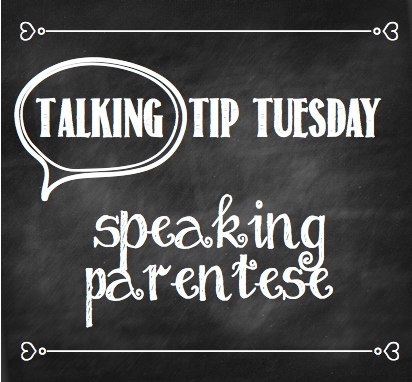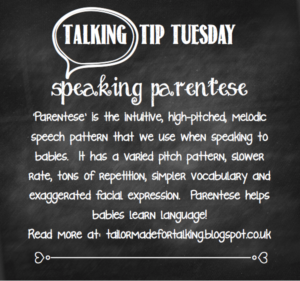Welcome to Tailor Made for Talking’s first edition of “Talking Tip Tuesday!” The name says it all. Every Tuesday, I will be sharing a tip with you all. A little tidbit of information, related to speech, language and/or communication that will act as the little something new that you learn on a Tuesday.
I was with my cousin a couple of weeks ago and he had just become the proud uncle of a gorgeous little girl. We were talking about this new bundle of joy and he said something that I thought was really interesting. He told me that he had heard that you weren’t supposed to talk to babies in ‘baby talk’ and he wanted to know if this was true. This question inspired my first “talking tip” and my answer to him is below!
‘Baby talk,’ also known as ‘Parentese’ (pronounced ‘parent-eez’) is that automatic, high-pitched, melodic speech pattern that automatically comes out of our mouths in the presence of babies.
“HELLOOOOO my little CUUUUTIE pie! I MISSED youuu!”
Believe it or not, there is a reason that we are wired to talk to babies in this predictable manner. Parentese has a more varied pitch pattern, a slower rate of speaking, tons of repetition, simpler vocabulary and exaggerated facial expression. These attributes are all ‘tailor made’ (excuse the pun!) for facilitating language development!
“Oh you’re playing with the ball. Do you like the ball? It’s a big ball!”
Research shows that babies prefer Parentese because it grabs their attention. Your exaggerated facial expressions help them to pay closer attention to your face and to how your mouth is moving.
The emphasis of important words and the repetitive manner of Parentese helps babies to figure out which words in the sentence are the most important. This facilitates the understanding of words and eventually helps them to learn to say the words!
What Parentese is not: Parentese is not “dumbed down” adult speech. We don’t want to speak telegraphically, or in “cuter” ways. For example, we don’t want to say “Mama wuv you!” This is the type of ‘baby talk’ that can hinder speech and language development because it is modelling incorrect pronunciation and grammar . We do want to say “Mama loves you!” In other words, Parentese uses the same pronunciation, grammar and vocabulary that you would use when speaking to an adult, but with added interest and emphasis to make it more exciting, funny and understandable for little baby who is eager to learn language!
So the next time you find yourself speaking in that high-pitched sing-songy voice around a baby, don’t stop! You are helping him or her to develop their language skills. They can thank you when they’re older 😉
Talking Tip Tuesday: Speaking Parentese


